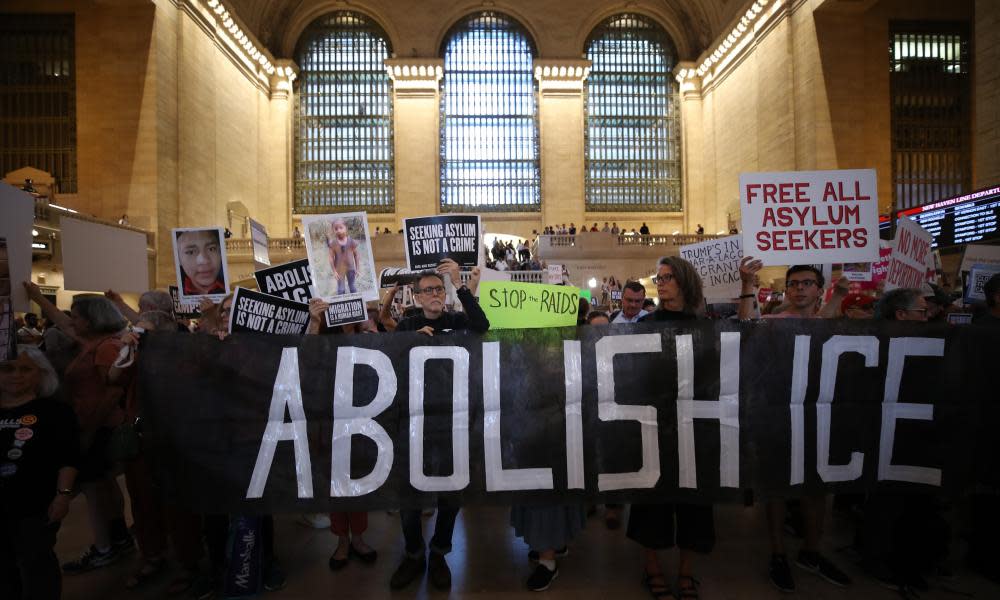Calls to end inhumane border conditions aren’t enough. Ice must be abolished

This summer, a coalition of award-winning authors came together with a plea to Congress: they called for an end to the inhumane conditions in detention centers, where women are forced to drink out of toilets and children go without food, water or medical care.
The writers, immigrants and refugees themselves, know just what is at stake: “Many of us came to the US as children and shudder to think how this country would treat us now,” they write. They urge Congress to mitigate the worst abuses of our immigration system, from unsafe conditions – in detention or third countries – to endless backlogs and convoluted legal processes.
Related: Are we approaching a turning point in US’s immigration crisis? | Jackie Stevens and James Marcus
The plea is commendable. But where are we as a society if we cannot dream bigger? What does it mean that some of our most beloved writers – who have laboriously envisioned new and radical worlds – didn’t imagine a future that respects the right to human movement?
The writer and political theorist Mark Fisher spoke to the stagnation of our political imagination through what he called capitalist realism. The concept, he wrote, is “the widespread sense that not only is capitalism the only viable political and economic system, but also that it is now impossible even to imagine a coherent alternative to it”. Following the fall of the Soviet Union, the encroachment of neoliberalism was read as a natural, inevitable progression – “the end of history”, the political scientist Francis Fukuyama wrote. Mark Fisher reminds us that this sense of inevitability is no accident, that there is nothing natural about it. Though other systems might be in many ways preferable to capitalism, a lack of coherent alternatives in the public imagination leaves us resigned to a future where we fight each time more desperately for ever-smaller crumbs.
Although Fisher tragically took his own life two years ago, his assessment reminds us that there exist futures far more radical and utopian within our reach, should we strive for them.
It’s far more radical to tolerate borders – to accept this violence as normal – than it is to call for their abolition
What does a “fair trial” look like on stolen land? Who has the authority to serve as arbiter of life and death? Faced with a system that fetishizes cruelty, our demands are too modest. It’s far more radical to tolerate borders – to accept this violence as normal – than it is to call for their abolition.
Consider Immigration and Customs Enforcement (Ice), which has been embroiled in scandals for its treatment of detainees for months on end. Although the agency has been in existence for under two decades, it has been mythologized such that it seems impossible to live without it.
Still, some are bravely calling for just that. While at first glance it may seem an impossible demand, Fisher’s alternative invites us to ask: what is there to salvage in an agency that exists solely to hunt, catalogue and detain the most vulnerable among us? Scandal after scandal has shown that the rot goes far beyond a few bad apples – Ice violence is as systematic as it is cruel. A child of the war on terror, there is no Ice without a tacit agreement that immigrants present an existential threat to our wellbeing. Calls to abolish Ice challenge us to know better.
The US spends more than $7bn a year on an agency so universally reviled that even its own agents want to be distanced. What could an alternative vision of justice look like? Republicans have never shied from making policy demands, however harmful and outlandish. Democrats have a singular opportunity to put forth a bold plan for immigration premised on human dignity and the freedom of movement. Abolitionist movements have always been discredited as impossible until they are realized. It is by refusing to concede to a rightwing vision of possibility that unimaginable prospects become reality.
Natascha Elena Uhlmann is the author of Abolish Ice (OR Books)

